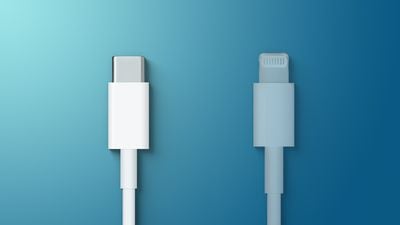The European Union today gave final approval to legislation that will force technology companies like Apple to switch to USB-C across a wide range of devices.

Outlined in an official press release, the European Council today gave the European Parliament's common charger directive approval, finalizing the legislative procedure that will make a USB-C port mandatory across a wide range of consumer electronic devices, including the iPhone and AirPods, by the end of 2024. The directive has now been officially adopted and is set to be published in the official journal of the European Union. It will come into force 20 days after publication, and the rules will apply exactly 24 months after that date. Products that go on sale before the date of application will be exempt and can continue to be sold after that point.
USB-C as a legally mandated "common port" is a world-first statute and will likely impact Apple in particular since it widely uses the Lightning connector instead of USB-C on many of its devices. MEPs claim that the move will reduce electronic waste, address product sustainability, and make use of different devices more convenient.
Regardless of their manufacturer, all new mobile phones, tablets, digital cameras, headphones and headsets, handheld videogame consoles and portable speakers, e-readers, keyboards, mice, portable navigation systems, earbuds and laptops that are rechargeable via a wired cable, with a power delivery of up to 100 Watts, will have to feature a USB-C port. Exemptions will apply for devices that are too small to offer a USB-C port, such as smart watches, health trackers, and some sports equipment, but the legislation is expected to expand to other devices over time. Companies will also have to ensure that dedicated labels clearly inform consumers about the charging characteristics of devices they buy.
In addition, the EU seeks to ensure that wireless charging solutions are interoperable as the technology evolves over time. The directive empowers the European Commission to develop delegated acts by the end of 2024 that force companies to make their custom wireless charging solutions more open and meet interoperability standards, helping consumers to avoid getting locked into proprietary charging solutions while preventing fragmentation and reducing waste. It is not clear if this would include Apple's MagSafe charging system for the iPhone and AirPods since it is based on the Qi wireless charging standard.
In 2018, the European Commission attempted to reach a final resolution on this issue but it failed to come into law. At the time, Apple warned that forcing a common charging port on the industry would stifle innovation and create electronic waste as consumers would be forced to switch to new cables.
The EU's effort resumed last year, with the European Commission spearheading a refreshed version of the directive. In April, the Internal Market and Consumer Protection Committee voted to support the directive, with 43 votes in favor and just two against. In June, the EU's Committee on Internal Market and Consumer Protection reached an agreement to introduce the directive to the European Parliament, which then voted overwhelmingly in favor of it.
Both Apple analyst Ming-Chi Kuo and Bloomberg's Mark Gurman believe Apple is testing a version of the iPhone that has a USB-C port instead of Lightning. Kuo believes that Apple could switch the iPhone to USB-C starting with 2023's iPhone 15, before transitioning AirPods and other accessories at a later date. This timing would allow Apple to switch many of its affected devices to USB-C ahead of the EU directive coming into force.
Last week, Apple launched a new Siri Remote for the Apple TV and the 10th-generation iPad, both of which replace the Lightning ports on their predecessors for USB-C, seemingly indicating that Apple's transition toward the common port is already well underway.
Note: Due to the political or social nature of the discussion regarding this topic, the discussion thread is located in our Political News forum. All forum members and site visitors are welcome to read and follow the thread, but posting is limited to forum members with at least 100 posts.
from Hacker News https://ift.tt/wQ6SzEI
No comments:
Post a Comment
Note: Only a member of this blog may post a comment.